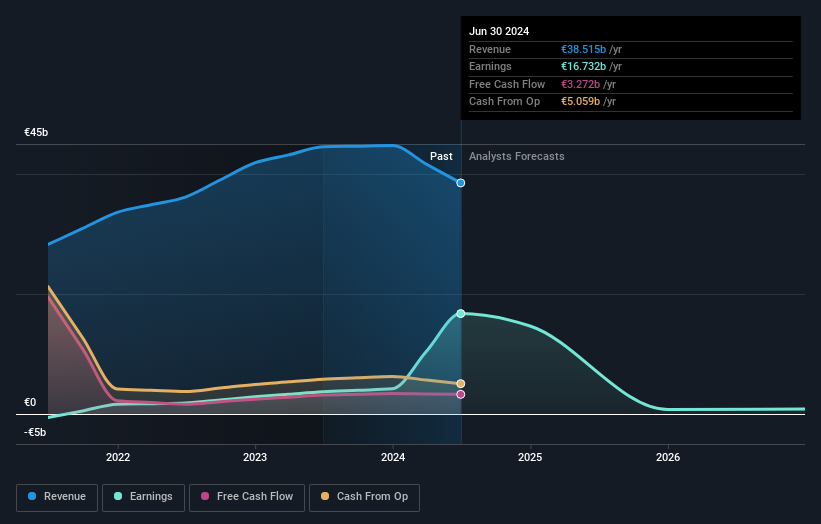- Netherlands
- /
- Diversified Financial
- /
- ENXTAM:EXO
Private companies account for 58% of Exor N.V.'s (AMS:EXO) ownership, while institutions account for 25%

Key Insights
- Exor's significant private companies ownership suggests that the key decisions are influenced by shareholders from the larger public
- Giovanni Agnelli B.V. owns 58% of the company
- Institutional ownership in Exor is 25%
To get a sense of who is truly in control of Exor N.V. (AMS:EXO), it is important to understand the ownership structure of the business. With 58% stake, private companies possess the maximum shares in the company. Put another way, the group faces the maximum upside potential (or downside risk).
And institutions on the other hand have a 25% ownership in the company. Institutions often own shares in more established companies, while it's not unusual to see insiders own a fair bit of smaller companies.
In the chart below, we zoom in on the different ownership groups of Exor.
Check out our latest analysis for Exor

What Does The Institutional Ownership Tell Us About Exor?
Many institutions measure their performance against an index that approximates the local market. So they usually pay more attention to companies that are included in major indices.
We can see that Exor does have institutional investors; and they hold a good portion of the company's stock. This implies the analysts working for those institutions have looked at the stock and they like it. But just like anyone else, they could be wrong. When multiple institutions own a stock, there's always a risk that they are in a 'crowded trade'. When such a trade goes wrong, multiple parties may compete to sell stock fast. This risk is higher in a company without a history of growth. You can see Exor's historic earnings and revenue below, but keep in mind there's always more to the story.

Exor is not owned by hedge funds. The company's largest shareholder is Giovanni Agnelli B.V., with ownership of 58%. This essentially means that they have extensive influence, if not outright control, over the future of the corporation. For context, the second largest shareholder holds about 5.1% of the shares outstanding, followed by an ownership of 4.2% by the third-largest shareholder.
Researching institutional ownership is a good way to gauge and filter a stock's expected performance. The same can be achieved by studying analyst sentiments. There is some analyst coverage of the stock, but it could still become more well known, with time.
Insider Ownership Of Exor
The definition of an insider can differ slightly between different countries, but members of the board of directors always count. Management ultimately answers to the board. However, it is not uncommon for managers to be executive board members, especially if they are a founder or the CEO.
I generally consider insider ownership to be a good thing. However, on some occasions it makes it more difficult for other shareholders to hold the board accountable for decisions.
Our data suggests that insiders own under 1% of Exor N.V. in their own names. We do note, however, it is possible insiders have an indirect interest through a private company or other corporate structure. As it is a large company, we'd only expect insiders to own a small percentage of it. But it's worth noting that they own €941k worth of shares. It is good to see board members owning shares, but it might be worth checking if those insiders have been buying.
General Public Ownership
The general public-- including retail investors -- own 16% stake in the company, and hence can't easily be ignored. While this group can't necessarily call the shots, it can certainly have a real influence on how the company is run.
Private Company Ownership
We can see that Private Companies own 58%, of the shares on issue. Private companies may be related parties. Sometimes insiders have an interest in a public company through a holding in a private company, rather than in their own capacity as an individual. While it's hard to draw any broad stroke conclusions, it is worth noting as an area for further research.
Next Steps:
It's always worth thinking about the different groups who own shares in a company. But to understand Exor better, we need to consider many other factors. For instance, we've identified 2 warning signs for Exor that you should be aware of.
If you would prefer discover what analysts are predicting in terms of future growth, do not miss this free report on analyst forecasts.
NB: Figures in this article are calculated using data from the last twelve months, which refer to the 12-month period ending on the last date of the month the financial statement is dated. This may not be consistent with full year annual report figures.
Valuation is complex, but we're here to simplify it.
Discover if Exor might be undervalued or overvalued with our detailed analysis, featuring fair value estimates, potential risks, dividends, insider trades, and its financial condition.
Access Free AnalysisHave feedback on this article? Concerned about the content? Get in touch with us directly. Alternatively, email editorial-team (at) simplywallst.com.
This article by Simply Wall St is general in nature. We provide commentary based on historical data and analyst forecasts only using an unbiased methodology and our articles are not intended to be financial advice. It does not constitute a recommendation to buy or sell any stock, and does not take account of your objectives, or your financial situation. We aim to bring you long-term focused analysis driven by fundamental data. Note that our analysis may not factor in the latest price-sensitive company announcements or qualitative material. Simply Wall St has no position in any stocks mentioned.
About ENXTAM:EXO
Exor
Engages in the luxury goods, automotive, agricultural and construction equipment, commercial vehicles, and professional football businesses worldwide.
Very undervalued with solid track record.


